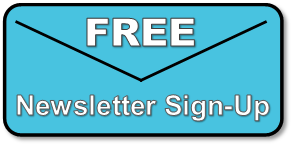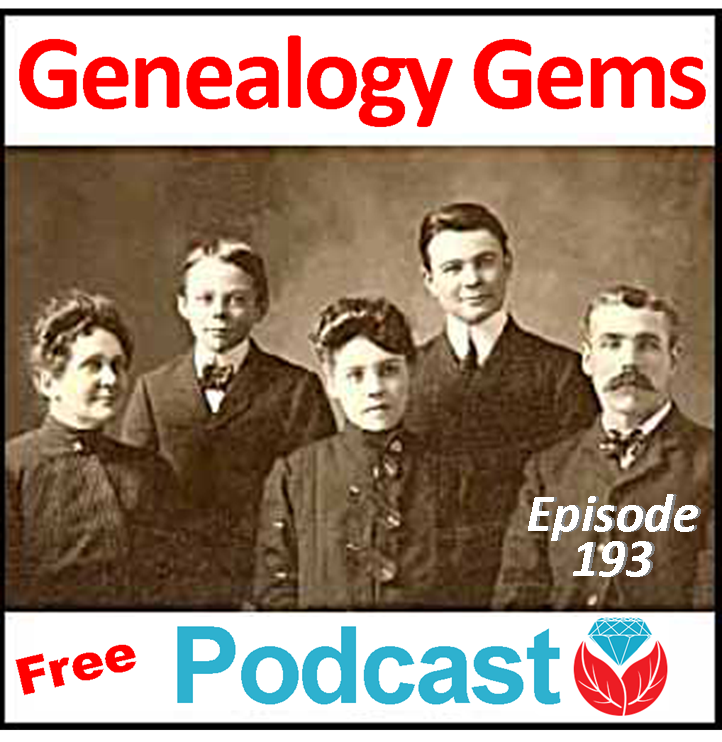 The Genealogy Gems Podcast
The Genealogy Gems Podcast
Episode # 193
by Lisa Louise Cooke
Episode highlights:
- Genealogy milestones, anniversaries, new records, upcoming conferences and new free video tutorials;
- Email response to The Genealogy Gems Podcast Episode #192: another tip on the U.S. Public Records Index, a family adoption story and his own research on the changing coastline of Sussex;
- More response to the “Where I’m From” poetry initiative;
- Announcement: the NEW Genealogy Gems Book Club title;
- A key principle in genetic genealogy from Your DNA Guide Diahan Southard.
NEWS: FOIA Turns 50
What is the FOIA? The Freedom of Information Act opens federal records to the public. The FOIA applies to certain kinds of information about the federal government and certain information created by the federal government. It DOESN’T apply to documents that relate to national security, privacy and trade secrets, or to documents created by state or local governments.
FOIA for genealogy research: Use the FOIA to request:
- SS5- applications (Social Security) and Railroad Board Retirement
- Post-WWII Selective Service records: draft registrations and SS-102 forms (with more draft/military information on them), through the end of 1959;
- Naturalization certificate files from 1906 to 1956;
- Alien registration forms from 1940 to 1944;
- Visa files from 1924 to1944;
- Registry files for 1929 to 1944 (these document the arrival of an immigrant whose passenger or other arrival record could not be found for whatever reason);
- A-files, alien case files for 1944 to 1951;
- Certain FBI files and certain CIA records (here’s a link to the slides from a National Archives presentation on using FBI files for family history.
Click here to read an article on the 50th anniversary of the FOIA and more on FOIA for genealogy
NEWS: NEW RECORD COLLECTIONS ONLINE
Niagara Falls, Ontario, Canada, Honeymoon and Visitor Registers, 1949-2011
The Genealogy Gems Premium Podcast #133: Peggy Lauritzen on “Gretna Greens,” quickie wedding destinations (Premium eLearning membership required to access)
Announcement of Freedmen’s Bureau Project completion; In September 2016 you can access the full Freedmen’s Bureau Project at www.DiscoverFreedmen.org.
New videos to help find your family history in Freedmen’s Bureau Records
Where to find Freedmen’s Bureau Records online, and the Freedmen’s Bureau indexing project
NEWS: AncestryDNA Hits 2 Million Samples
Ancestry.com blog post: AncestryDNA Reaches 2 Million Samples
Your DNA Guide Diahan Southard talks about these AncestryDNA features in:
- AncestryDNA improves genetic matching technology
- Confused by your AncestryDNA matches? Read this article
- DNA Circles: When they DON’T mean genetic connections on AncestryDNA
- AncestryDNA Common Matches tool
- AncestryDNA Works Toward Genetics + Genealogy Integration
NEWS: UPCOMING CONFERENCES
- Midwest Roots, July 15-16, 2016
- The Genealogy Gems Podcast episode #178 CeCe Moore talks genetic genealogy on genealogy TV shows
- Northwest Missouri Genealogical Society 3rd Annual Conference, July 30, 2016
- 3rd Annual Northwest Genealogy Conference, Arlington,
3rd Annual Northwest Genealogy Conference
- Hosted by the Stillaguamish Valley Genealogical Society, north of Seattle in Arlington, WA on August 17-20, 2016
- Theme: “Family Secrets Uncovered — Lost History Found”
- Keynote speakers include Blaine Bettinger, Claudia Breland and Lisa Louise Cooke
- Free Day Wednesday afternoon: Beth Foulk will address beginner’s issues — which is also a good refresher for the more seasoned genealogists
- Other features: Meet a distant cousin with the “Cousin Wall;” participate in the genealogy-related scavenger hunt on Free Day Wednesday, and enjoy the free taco bar at the evening reception. Wear a costume from your ancestors’ homeland on the Friday dress-up day.
GEMS NEWS: NEW VIDEOS ONLINE
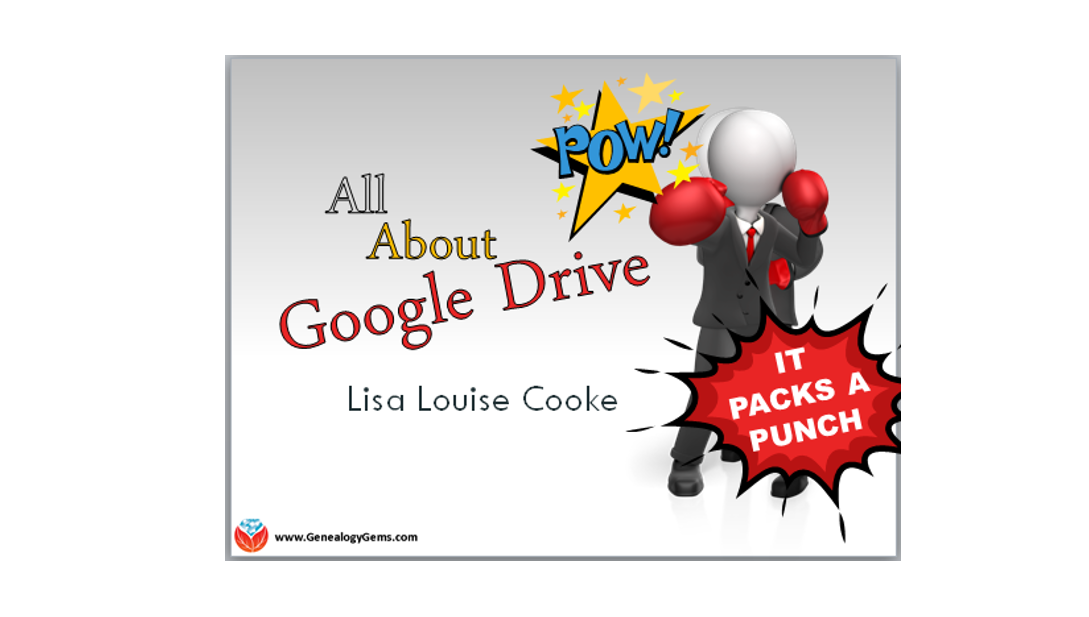
- How to create captivating family history videos: Animoto video tutorial series
- Tech Tip Tuesday tutorial videos
- NEW Genealogy Gems Premium Video: All About Google Drive (Genealogy Gems Premium website membership required to access)
- Evernote blog post about changed pricing
 MAILBOX: CHRIS WITH US PUBLIC RECORDS INDEX TIP AND MORE
MAILBOX: CHRIS WITH US PUBLIC RECORDS INDEX TIP AND MORE
Follow-up email regarding The Genealogy Gems Podcast episode #192 from Chris, who blogs at Leaf, Twig and Stem
Chris’ post about a compelling story of an adopted child in his family
Chris’ post about the changing coastline in Sussex
MAILBOX: “WHERE I’M FROM”
The Genealogy Gems Podcast episode #185: Interview with George Ella Lyon
“Where I’m From” video and contest results
Tips for writing your own “Where I’m From” poem
Santa Clara County Historical and Genealogical Society “Where I’m From” contest: “Anyone near and far may join our Contest. Each entry receives a gift from the. We will have a drawing from all entries of cash or a nice prize. Deadline for entries is Aug. 31, 2016. More information on scchgs.org.”
NEW GENEALOGY GEMS BOOK CLUB SELECTION
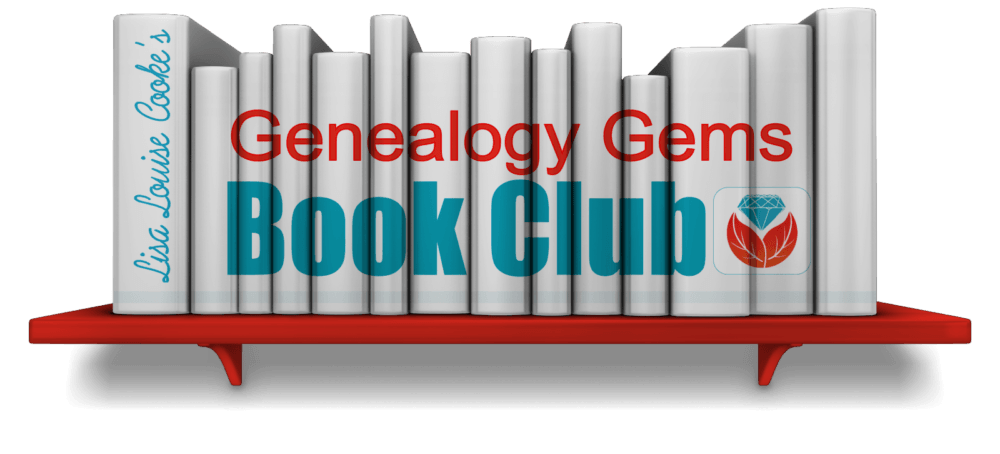
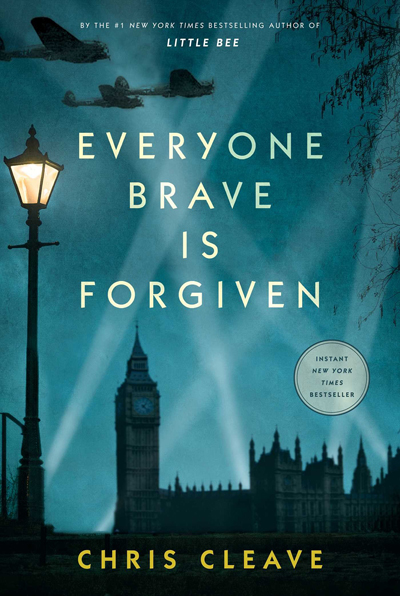 Everyone Brave is Forgiven by Chris Cleave
Everyone Brave is Forgiven by Chris Cleave
It’s a story inspired by love letters exchanged between his grandparents during World War II, when they were each in dangerous places: he on the island of Malta and she in London, both of which suffered some of the worst sustained bombing campaigns of the war.
Everyone Brave is Forgiven is a fast-paced book. It begins in London in 1939 with Mary North, a wealthy young lady from a privileged family who, on finding out that war has been declared, immediately leaves her finishing school and signs on for the war effort without telling her parents. She fulfills an assignment as a school teacher long enough to make a meaningful connection with a school official and one of her students. Then her students (along with the rest of London’s children) are evacuated to the countryside, leaving her to figure out what to do next.
The plot gets a lot more involved from here. There’s a love triangle, a long-distance romance, a series of scenes that take place on the heavily-bombarded island of Malta, harrowing descriptions of the London Blitz, homeless children who return from the evacuation only to find themselves parentless, homeless and in constant danger. It’s intense and eye-opening, but it’s compassionate and it’s still very readable for those who have less of a stomach for blood and guts but still want to understand some of the human experience of living and loving in a war zone, and then picking up the pieces afterward and figuring out how to keep living.
Video: Chris Cleave on the U.S troops coming to Europe in World War II
Click here for more Genealogy Gems Book Club titles
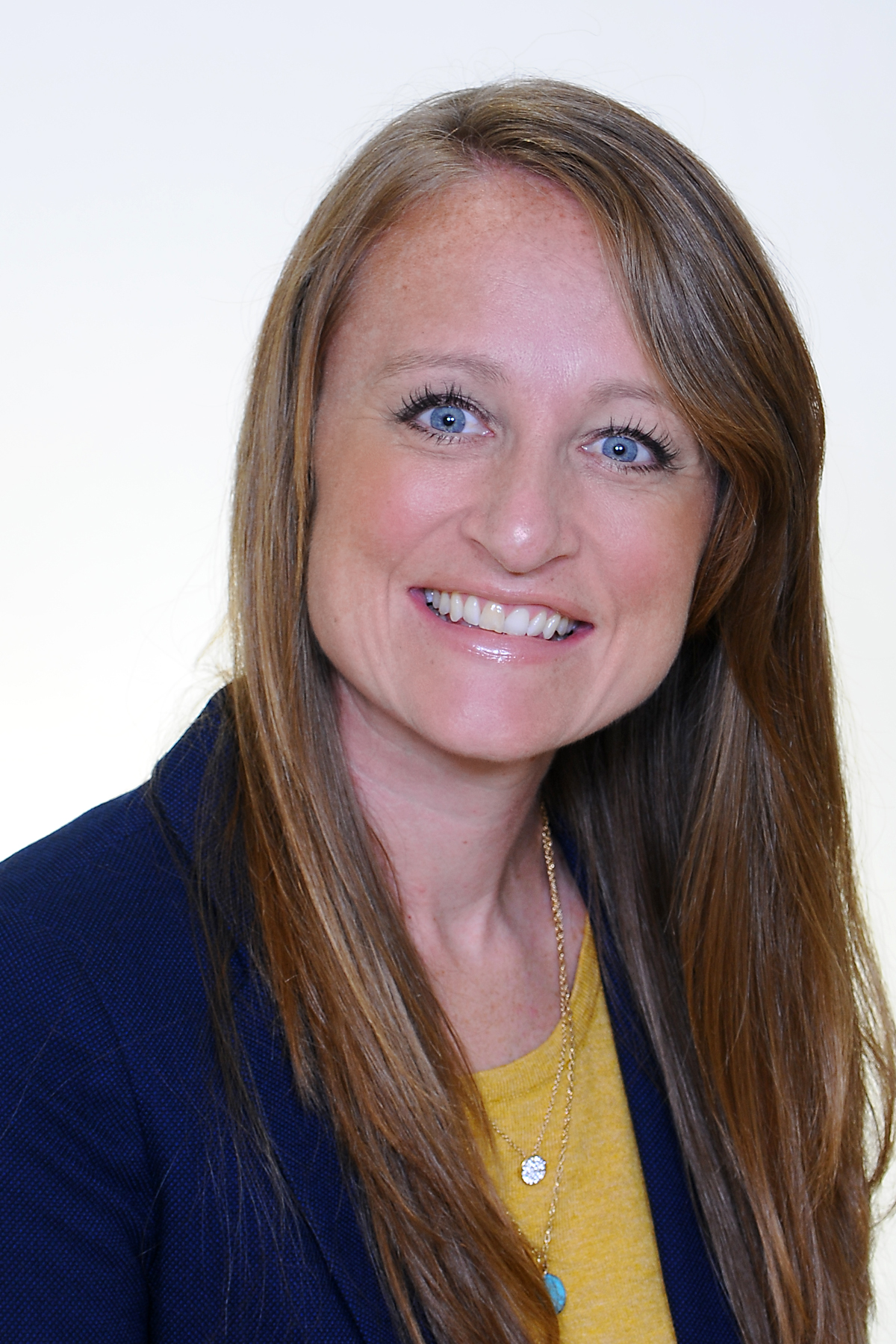 DNA GEM: GENETIC PEDIGREE V GENEALOGICAL PEDIGREE
DNA GEM: GENETIC PEDIGREE V GENEALOGICAL PEDIGREE
A key concept in genetic genealogy is that your genetic pedigree is different than your genealogical pedigree. Let me explain.
Your genealogical pedigree, if you are diligent or lucky (or both!) can contain hundreds, even thousands of names and can go back countless generations. You can include as many collateral lines as you want. You can add several sources to your findings, and these days you can even add media, including pictures and copies of the actual documents. Every time someone gets married or welcomes a new baby, you can add that to your chart. In short, there is no end to the amount of information that can make up your pedigree chart.
Not so for your genetic pedigree.
Your genetic pedigree contains only those ancestors for whom you have received some of their DNA. You do not have DNA from all of your ancestors. Using some fancy math we can calculate that the average generation in which you start to see that you have inherited zero blocks of DNA from an ancestor is about seven. But of course, most of us aren’t trying to figure out how much of our DNA we received from great great great grandma Sarah. Most of us just have a list of DNA matches and we are trying to figure out if we are all related to 3X great grandma Sarah. So how does that work?
Well, the first thing we need to recognize is that living descendants of Sarah’s would be our fourth cousins (though not always, but that is a topic for another post!). Again, bring in the fancy math and we can learn that living, documented fourth cousins who have this autosomal DNA test completed will only share DNA with each other 50% of the time.
Yes, only half.
Only half of the time your DNA will tell you what your paper trail might have already figured out: That you and cousin Jim are fourth cousins, related through sweet 3X great grandma Sarah. But here’s where the numbers are in our favor. You have, on average, 940 fourth cousins. So if you are only sharing DNA with 470 of them, that’s not quite so bad, is it? And it only takes one or two of them to be tested and show up on your match list. Their presence there, and their documentation back to sweet Sarah, helps to verify the genealogy you have completed and allows you to gather others who might share this connection so you can learn even more about Sarah and her family. Plus, if you find Jim, then Jim will have 470 4th cousins as well, some of which will not be on your list, giving you access to even more of the 940.
This genetic family tree not matching up exactly with your traditional family tree also manifests itself in your ethnicity results, though there are other reasons for discrepancies there as well.
In short, this DNA stuff is not perfect, or even complete, but if you combine it with your traditional resources, it can be a very powerful tool for verifying and extending your family history.
Additional readings:
- 23andMe blog post: “How Many Relatives Do You Have?”
- “How Much of Your Genome Do You Inherit from a Particular Ancestor?”
PROFILE AMERICA: First hamburgers at a 4th of July picnic
Disclosure: This article contains affiliate links and Genealogy Gems will be compensated if you make a purchase after clicking on these links (at no additional cost to you). Thank you for supporting Genealogy Gems!

